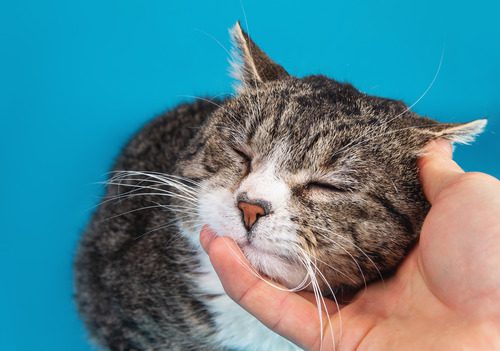Caring for Aging Felines: Identifying Signs of Pain and Discomfort
As our beloved cats enter their senior years, it’s essential to stay vigilant about their health and comfort. Aging brings changes, and it’s not uncommon for senior cats to experience pain or discomfort. In this article, we’ll explore how to recognize signs of pain in senior cats and the importance of professional veterinary care. If you have concerns about your aging feline, Whitney Veterinary Hospital in Peoria, IL is here to help. Call us at (309) 685-4707 for guidance or to schedule an appointment.

Understanding Pain in Senior Cats
Recognizing the Subtle Signs
Senior cats often hide their pain, a natural behavior in the animal kingdom. Look for subtle changes such as:
- Decreased activity
- Reluctance to jump or climb
- Changes in grooming habits
- Reduced appetite
- Excessive sleeping
- Increased vocalization
- Aggression when touched
- Withdrawal from social interactions
These changes often signal that your cat is experiencing pain or discomfort. If you notice any of these in your feline companion, contact Whitney Veterinary Hospital for guidance or to schedule an appointment.
The Role of Veterinary Care in Managing Pain
Regular Check-ups and Diagnostics
Regular veterinary visits are vital for aging cats. Vets can detect early signs of conditions that may cause pain, such as arthritis or dental issues. Diagnostics like X-rays or blood tests may be necessary to pinpoint the cause of your cat’s discomfort.
Importance of Early Detection
Early detection of pain in senior cats can significantly improve their quality of life. Regular veterinary check-ups can catch issues before they become more serious, making treatment more effective.
Professional Pain Management
Your vet can offer solutions for pain management. This may include medications, dietary changes, or lifestyle modifications to ensure your cat’s comfort and well-being. It’s crucial to follow the vet’s advice and never give human medications to cats.
Home Care Strategies for Comfort
- Creating a Comfortable Environment: Make your home more senior-cat friendly. This includes providing easy access to food, water, and litter boxes, and creating comfortable resting areas with soft bedding.
- Gentle Exercise and Play: Engage your senior cat in gentle exercise to maintain mobility and muscle tone. Keep play sessions short and gentle, and be mindful of their limitations.
- Nutritional Considerations: Nutrition plays a critical role in managing pain and discomfort. Your vet may recommend a diet formulated for senior cats, which can help in maintaining an ideal body weight and providing essential nutrients for joint health.
When to Contact Your Veterinarian
Keep a close eye on your cat’s behavior and physical condition. Any significant changes should prompt a call to your veterinarian. Regular visits to Whitney Veterinary Hospital can help in monitoring your senior cat’s health and catching any signs of discomfort early. If your cat shows signs of severe pain, such as crying out, panting, or hiding, contact your veterinarian immediately. These signs indicate a need for urgent medical attention.
Supporting Your Senior Cat’s Health
Caring for aging felines involves a keen eye and a proactive approach. By recognizing signs of pain in senior cats, providing a comfortable home environment, and maintaining regular veterinary care, you can ensure your cat’s golden years are as comfortable and happy as possible. For more advice or to schedule an appointment for your senior cat, call Whitney Veterinary Hospital in Peoria, IL at (309) 685-4707.
